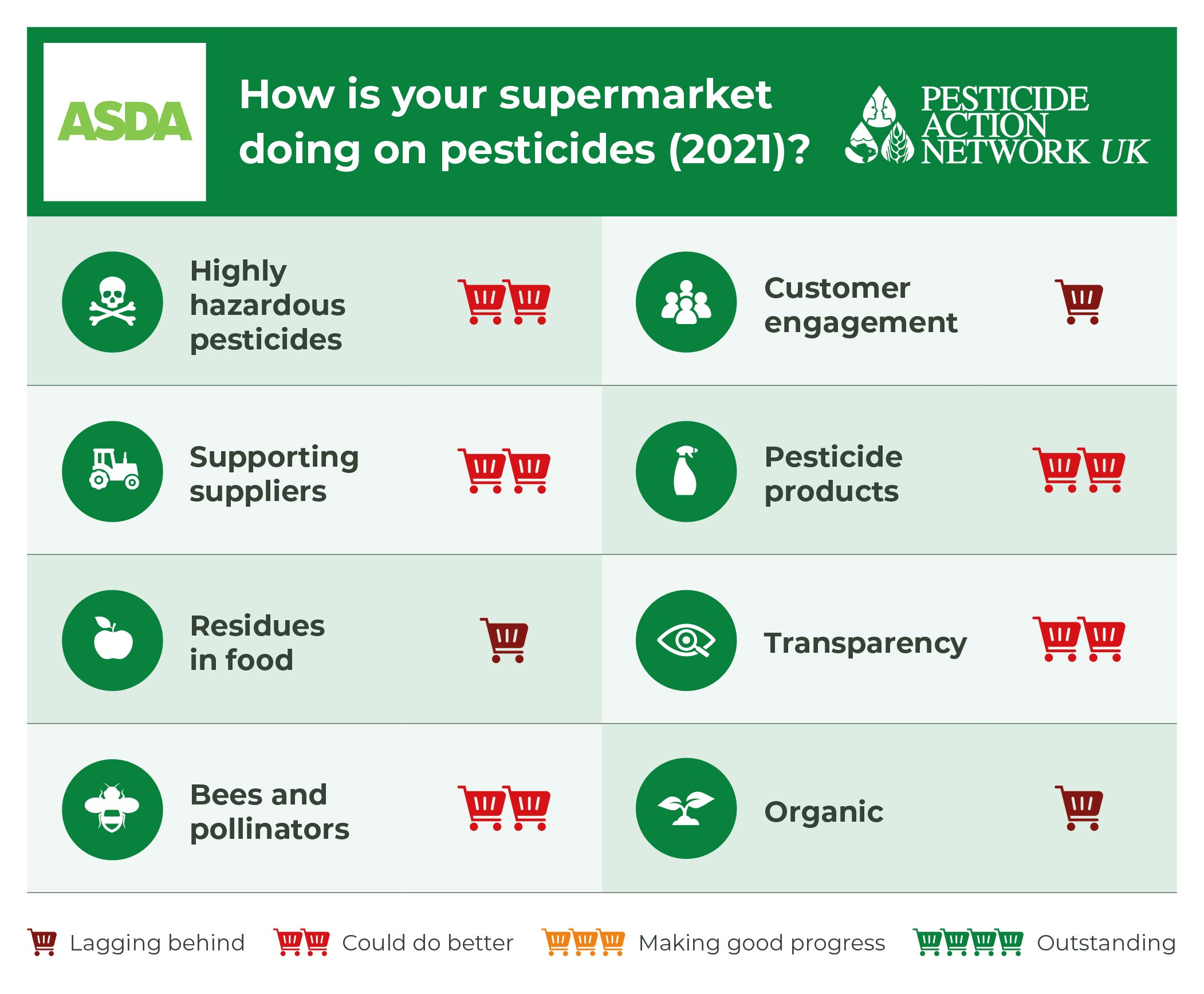Asda
Asda came eighth out of ten supermarkets in the 2021 ranking, the same position as in 2019. While the company has made some progress on reducing the range of pesticide products it sells, it is still not doing enough to support its suppliers to use non-chemical alternatives. As with all other UK supermarkets, Asda could be doing more to reduce pesticide-related harms in its global supply chains.

Phasing out the most hazardous pesticides

Asda has lists of pesticides that it monitors, restricts or prohibits from use within its global supply chains. These lists were updated in the company’s new pesticide policy which was published in May 2021, and included a commitment to end the use of 31 additional highly hazardous pesticides.
While Asda regularly updates its pesticide lists, the company relies on a relatively limited set of hazard criteria and takes a less robust approach when compared to many other supermarkets. As a result, many pesticides which are of major concern to PAN UK due to their high potential to cause harm to human health or the environment are simply monitored within the company’s supply chain, rather than being restricted or banned. For example, two years ago PAN UK highlighted that Asda had taken no action to end the use of thiacloprid which was banned in the EU in October 2019 due to concerns that it could cause harm to human health. Despite this, thiacloprid sits on Asda’s monitored lists and therefore remains in use across the company’s global supply chains. In addition, Asda doesn’t require any additional worker safety measures to be taken for pesticides of particular concern.
Supporting suppliers to use non-chemical alternatives

Asda is taking a number of actions aimed at supporting its suppliers to adopt non-chemical alternatives, but could be doing more. It has set up an online forum that allows suppliers, growers and a network of industry experts to share best practice case studies in multiple areas including pesticide reduction and alternative pest control methods. The company said that its “Growers are encouraged to utilise the tools, guidance and training available to them”. Asda also told PAN UK that it makes efforts to decrease post-harvest use of pesticides by ensuring that produce is both stored and transported in a way which reduces the need for fungicides (which prevent fresh produce from rotting).
However, Asda is still not doing enough to encourage, or support, its suppliers to use non-chemical methods of pest control. Unlike many other supermarkets, it does not fund research into non-chemical alternatives or offer its suppliers bespoke advice on how to adopt non-chemical pest control techniques for specific crops.
Reducing harm caused to bees and pollinators

Asda has implemented a handful of new measures to protect bees and other pollinators from pesticides since 2019 but could be doing more. The company acknowledges the need for pollinator-friendly approaches in its pesticide policy, and has placed neonicotinoids (which are highly toxic to bees) and some other harmful pesticides on its restricted list. This means growers who want to use these pesticides must apply to Asda for permission and justify why alternative pest control methods aren’t an option. Asda has also put an online forum in place to encourage growers and suppliers to share case studies and best practice on pollinator-friendly practices.
However, overall, the company is not taking enough action to minimise the harm caused to pollinators by their supply chains. Asda haven’t banned bee-harming neonicotinoid pesticides from their global supply chains and have no phase out plan in place to do so. The company also isn’t currently funding research into the effect of pesticides on pollinators and alternative non-chemical practices that could be employed by farmers. Asda also does not require its suppliers to monitor pollinator activity.
Selling pesticide products

Asda continues to sell pesticide products on its shelves, including three own-brand weedkillers. Since the last supermarket ranking in 2019, however, Asda has made some positive changes to its range. The company told PAN UK that it has replaced one of its own-brand Bug Killers with a “non-pesticide based spray” and will be removing 14 branded lines of pesticide products from sale in 2021. The company also sells non-chemical alternatives to pesticides such as slug wool pellets and copper tape.
Asda told PAN UK that it does not offer deals and discounts on pesticides. This is a positive since it discourages people from buying more than they need and getting rid of the excess down the drain or in the bin, which can contaminate drinking water and soils. However, Asda does not currently provide information – beyond that included on product labels – to members of the public on how to minimise the health and environmental risks associated to using pesticide products, or on non-chemical alternatives.
Being transparent about pesticides

Asda has made good progress on increasing transparency regarding pesticides. Customers can now access Asda’s detailed pesticide policy online, as well as lists of which pesticides the company monitors, restricts and prohibits within its supply chains. Asda also now publishes an overview of results from its in-house pesticide residue testing programme. However, this only provides general information outlining residues found on broad categories such as ‘fruit’, ‘vegetables’ and ‘salad’ and does not name the specific pesticides found. As a result, it remains impossible for Asda customers to make shopping decisions based on which produce is likely to contain higher levels of pesticide residues. Whilst all this information is available on the Asda website, it is difficult to find so customers are unlikely to come across it.
Monitoring and reducing pesticide residues in food

Since the last supermarket ranking in 2019, Asda has expanded the variety of food items it tests for pesticide residues. The company continues to test fruit and vegetables, fish, meat, dairy, rice and wheat products such as bread and pasta and has now added baby food, fruit juices, herbs and spices, canned goods, and dried fruit and pulses. Unlike some other supermarkets, it still doesn’t test processed foods or nuts. When asked if there were any action plans in place for tackling the most serious residue problems, Asda told PAN UK that they “implement the produce plant protection policy” but did not provide any further information on what this entails.
Despite telling PAN UK that it has an independent residue-monitoring programme which tests a wide-range of samples throughout the year, Asda isn’t currently using the results to decide where best to prioritise its efforts to tackle pesticides. This is a missed opportunity since residue data can help a supermarket identify both which pesticides to prioritise for phase out and which farmers need greater support to switch to non-chemical alternatives.
Engaging with customers on reducing pesticide use

In contrast to most other supermarkets, Asda are now failing to take any of the three key actions which enable supermarkets to involve their customers in helping them to reduce pesticide use in their supply chains:
- Since the last ranking in 2019, Asda has stopped selling imperfect fruit and vegetables. The sale of so called ‘wonky’ fruit and vegetables reduces the need for cosmetic pesticides.
- The company doesn’t encourage its customers to accept finding the odd bug in fresh produce. This is a missed opportunity since customer complaints about insects can often hold a supermarket back from reducing its pesticide use. However, once shoppers understand that the bug is in their lettuce (for example) because it has been grown with fewer chemicals, they tend to be supportive.
- Asda also told PAN UK that they are still not making any particular efforts to promote fruit and vegetables that are in season and therefore more likely to be grown closer to home. This is another missed opportunity since keeping supply chains short tends to lessen the need to use fungicides which prevent fresh produce from rotting while they are being transported.
Boosting organic sales

Asda sells a range of 47 different organic products and an additional 20 organic baby food lines. The company told PAN UK that it is “looking at areas to increase its organic offering”. Despite this, Asda is not currently undertaking any significant activities to either boost organic sales or communicate the benefits of buying organic to the public. The company also doesn’t have any measures in place to support its non-organic suppliers to convert to organic production.













